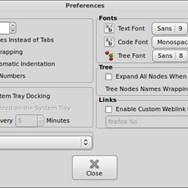CherryTree vs Piggydb
Compare features, pricing, and capabilities to find which solution is best for your needs.

CherryTree
CherryTree is a powerful, free, and open-source hierarchical note-taking application. It allows you to organize your thoughts, ideas, notes, and code snippets in a tree-like structure with rich text editing and syntax highlighting. by Giuseppe Penone

Piggydb
Piggydb is an open-source web notebook application designed for building and managing knowledge bases, either individually or collaboratively. It emphasizes structured organization through hierarchical tagging and concept mapping. by Daisuke Morita
Comparison Summary
CherryTree and Piggydb are both powerful solutions in their space. CherryTree offers cherrytree is a powerful, free, and open-source hierarchical note-taking application. it allows you to organize your thoughts, ideas, notes, and code snippets in a tree-like structure with rich text editing and syntax highlighting., while Piggydb provides piggydb is an open-source web notebook application designed for building and managing knowledge bases, either individually or collaboratively. it emphasizes structured organization through hierarchical tagging and concept mapping.. Compare their features and pricing to find the best match for your needs.
Pros & Cons Comparison

CherryTree
Analysis & Comparison
Advantages
Limitations

Piggydb
Analysis & Comparison
Advantages
Limitations
Compare with Others
Explore more comparisons and alternatives















